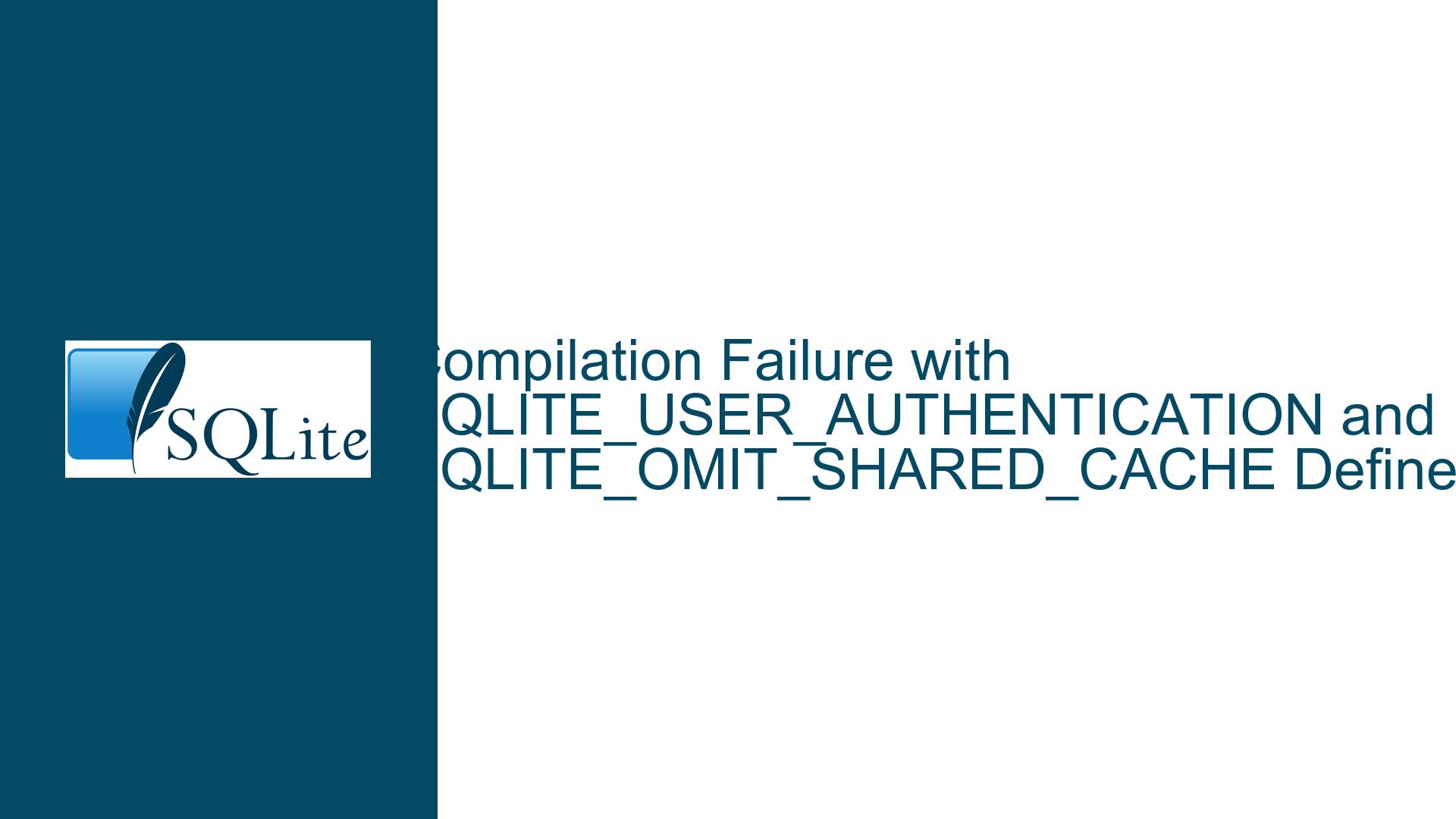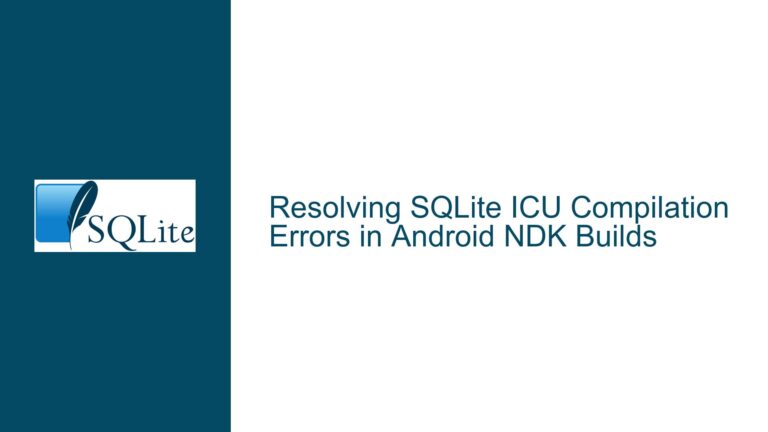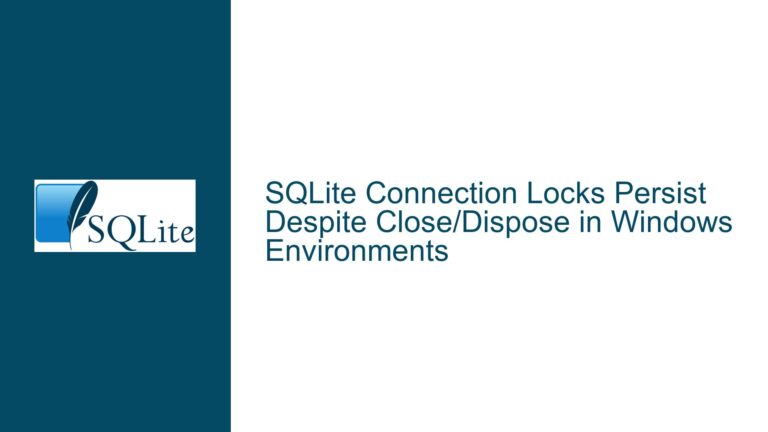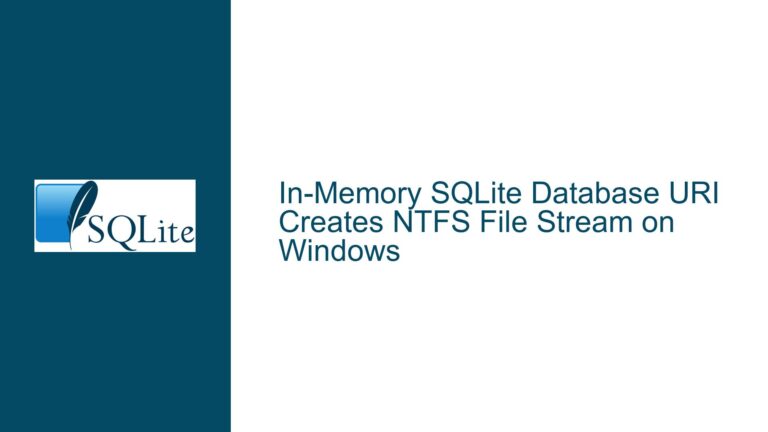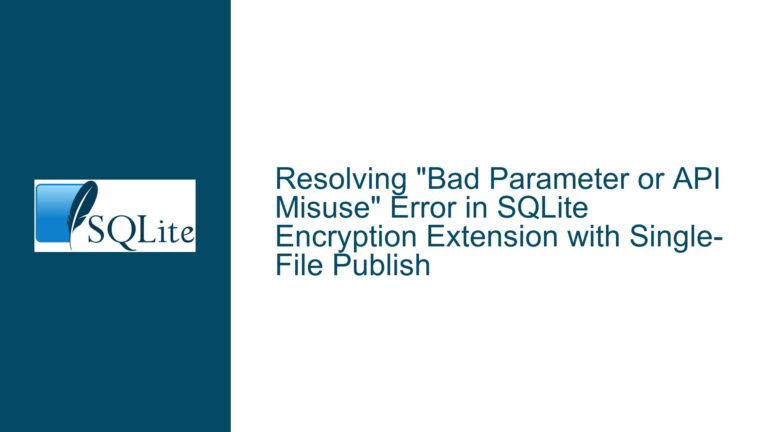Compilation Failure with SQLITE_USER_AUTHENTICATION and SQLITE_OMIT_SHARED_CACHE Defined
Compilation Error Due to Undefined nTableLock Field
The core issue arises when attempting to compile SQLite with both the SQLITE_USER_AUTHENTICATION and SQLITE_OMIT_SHARED_CACHE compile-time options enabled. The compilation fails specifically at line 193 in the build.c source file, where the code attempts to access the nTableLock field of the pParse structure. This field is only defined when SQLITE_OMIT_SHARED_CACHE is not defined. The error occurs because the SQLITE_USER_AUTHENTICATION feature relies on the nTableLock field to perform user authentication checks during the parsing phase of SQL statement execution. When SQLITE_OMIT_SHARED_CACHE is defined, the nTableLock field is excluded from the pParse structure, leading to a compilation error.
The SQLITE_USER_AUTHENTICATION feature is designed to enforce user authentication checks before allowing certain operations on the database. It does this by verifying the user’s authentication level during the parsing phase. The nTableLock field is used to determine whether table locks are being acquired, which is a prerequisite for certain authentication checks. When SQLITE_OMIT_SHARED_CACHE is defined, the shared cache feature is disabled, and the nTableLock field is no longer necessary, as table locks are not used in this mode. However, the SQLITE_USER_AUTHENTICATION feature does not account for this scenario, leading to a compilation failure.
The error message indicates that the nTableLock field is undefined when SQLITE_OMIT_SHARED_CACHE is defined. This is because the pParse structure is conditionally compiled based on the presence of the SQLITE_OMIT_SHARED_CACHE option. When this option is defined, the nTableLock field is excluded from the pParse structure, making it inaccessible to the SQLITE_USER_AUTHENTICATION feature. This creates a dependency conflict between the two compile-time options, resulting in a compilation failure.
Dependency Conflict Between Shared Cache and User Authentication Features
The root cause of the compilation failure lies in the dependency conflict between the SQLITE_OMIT_SHARED_CACHE and SQLITE_USER_AUTHENTICATION compile-time options. The SQLITE_OMIT_SHARED_CACHE option disables the shared cache feature, which is an obsolete feature that allows multiple database connections to share a single cache. When this option is defined, the nTableLock field is excluded from the pParse structure, as table locks are no longer necessary in this mode. However, the SQLITE_USER_AUTHENTICATION feature relies on the nTableLock field to perform user authentication checks during the parsing phase.
The SQLITE_USER_AUTHENTICATION feature is designed to enforce user authentication checks before allowing certain operations on the database. It does this by verifying the user’s authentication level during the parsing phase. The nTableLock field is used to determine whether table locks are being acquired, which is a prerequisite for certain authentication checks. When SQLITE_OMIT_SHARED_CACHE is defined, the shared cache feature is disabled, and the nTableLock field is no longer necessary, as table locks are not used in this mode. However, the SQLITE_USER_AUTHENTICATION feature does not account for this scenario, leading to a compilation failure.
The dependency conflict arises because the SQLITE_USER_AUTHENTICATION feature assumes that the nTableLock field will always be available, regardless of whether the shared cache feature is enabled or disabled. This assumption is incorrect when SQLITE_OMIT_SHARED_CACHE is defined, as the nTableLock field is excluded from the pParse structure in this mode. This creates a situation where the SQLITE_USER_AUTHENTICATION feature attempts to access a field that does not exist, resulting in a compilation error.
The issue is further compounded by the fact that the SQLITE_OMIT_SHARED_CACHE option is recommended by the SQLite documentation, which states that shared-cache mode is an obsolete feature and its use is discouraged. This means that developers are encouraged to define the SQLITE_OMIT_SHARED_CACHE option when compiling SQLite, but doing so can lead to compilation errors if the SQLITE_USER_AUTHENTICATION feature is also enabled. This creates a dilemma for developers who want to use the SQLITE_USER_AUTHENTICATION feature while also following the recommendation to disable the shared cache feature.
Resolving the Compilation Error by Modifying Conditional Compilation Logic
To resolve the compilation error, the conditional compilation logic in the SQLite source code must be modified to account for the dependency conflict between the SQLITE_OMIT_SHARED_CACHE and SQLITE_USER_AUTHENTICATION options. This can be achieved by introducing additional conditional compilation checks to ensure that the nTableLock field is only accessed when it is defined. Specifically, the code in the build.c file should be modified to include a check for the presence of the nTableLock field before attempting to access it.
The modified code should look something like this:
#if SQLITE_USER_AUTHENTICATION
#if !defined(SQLITE_OMIT_SHARED_CACHE) || defined(SQLITE_USER_AUTHENTICATION_FORCE_NTABLELOCK)
if( pParse->nTableLock>0 && db->init.busy==0 ){
sqlite3UserAuthInit(db);
if( db->auth.authLevel<UAUTH_User ){
sqlite3ErrorMsg(pParse, "user not authenticated");
pParse->rc = SQLITE_AUTH_USER;
return;
}
}
#endif
#endif
In this modified code, the #if !defined(SQLITE_OMIT_SHARED_CACHE) || defined(SQLITE_USER_AUTHENTICATION_FORCE_NTABLELOCK) condition ensures that the nTableLock field is only accessed when it is defined. This prevents the compilation error that occurs when SQLITE_OMIT_SHARED_CACHE is defined. Additionally, a new compile-time option, SQLITE_USER_AUTHENTICATION_FORCE_NTABLELOCK, can be introduced to allow developers to force the use of the nTableLock field even when SQLITE_OMIT_SHARED_CACHE is defined. This provides a workaround for developers who need to use the SQLITE_USER_AUTHENTICATION feature while also disabling the shared cache feature.
The introduction of the SQLITE_USER_AUTHENTICATION_FORCE_NTABLELOCK option allows developers to explicitly enable the use of the nTableLock field, even when SQLITE_OMIT_SHARED_CACHE is defined. This provides a way to resolve the dependency conflict between the two compile-time options without requiring significant changes to the SQLite source code. However, this approach should be used with caution, as it may introduce additional complexity and potential side effects.
Another approach to resolving the compilation error is to modify the SQLITE_USER_AUTHENTICATION feature to remove its dependency on the nTableLock field. This can be achieved by introducing an alternative mechanism for performing user authentication checks that does not rely on the nTableLock field. For example, the SQLITE_USER_AUTHENTICATION feature could be modified to use a different field or mechanism to determine whether user authentication checks are necessary. This would eliminate the dependency conflict and allow the SQLITE_USER_AUTHENTICATION feature to be used in conjunction with the SQLITE_OMIT_SHARED_CACHE option without causing a compilation error.
In conclusion, the compilation error caused by the dependency conflict between the SQLITE_OMIT_SHARED_CACHE and SQLITE_USER_AUTHENTICATION options can be resolved by modifying the conditional compilation logic in the SQLite source code. This can be achieved by introducing additional conditional compilation checks or by modifying the SQLITE_USER_AUTHENTICATION feature to remove its dependency on the nTableLock field. Both approaches provide a way to resolve the compilation error while allowing developers to use the SQLITE_USER_AUTHENTICATION feature in conjunction with the SQLITE_OMIT_SHARED_CACHE option.
